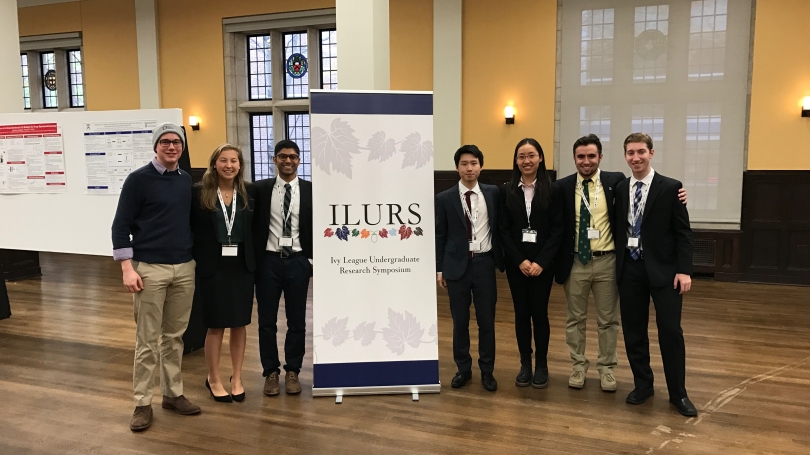
- Public Policy
- Leadership
- Funding
- News & Events
- About the Center
Back to Top Nav
Back to Top Nav
Back to Top Nav
Back to Top Nav
As a presenter at the first Ivy League Undergraduate Research Symposium, I had the privilege of joining a group of students who brought with them powerful ideas. At Dartmouth, there is a diversity of exploratory research that enriches both our community and the greater world. I was proud to bring some of that work to an event that hosted students who also represented their esteemed institutions.
The symposium welcomed 135 students from all of the Ivy League schools, showing that we are all together in the effort to learn about the world around us in so many different ways. Research topics ranged from cellular nanoengineering to new uses of CRISPR, x-ray spectromicroscopy to quantum superconducting circuits, social associations of dolphins to arthropod assemblages, sexual risk-taking to conscientiousness and mindfulness, and social change in Chile to education emancipation. It was important to be exposed to and learn from students in a variety disciplines. Some of the most powerful projects were those which I would have never seen as a STEM major.
The symposium was structured so that students could interface with each other. Two 2-hour blocks were devoted to poster presentations in which we all spoke to each other, faculty, and visiting guests. When not describing my research, I was able to go and listen to cutting edge work in so many different fields. I learned about things like how superconductors could be used for quantum computing, how brainwaves can manipulate a computer cursor and robotic arm, and how one researcher’s great-grandmother helped create social change in South America. Some students were chosen as plenary speakers and got to deliver talks to the whole group. Additionally, several hour-long talks were given by faculty of the Ivy League in areas, such as chemical earth sciences, chromosomal biology, and business.
Another valuable component of the symposium was creating bonds within the Ivy League. By coincidence, I found that two close friends were also attending the event (one was my roommate), and we quickly became comfortable in the setting, making new friends the whole time. It was great to share experiences from our own lives with those at other schools. Through poster sessions, lectures, meals, a cocktail event, and free time at night, we became fairly close in such a short time. We made relationships with people from these other places that we might have never made otherwise. When it was time to go, I knew I would take with me new knowledge, connections, and memories.
After attending the symposium and returning to Dartmouth, I have and will continue to share my experiences. While no formal event was organized to communicate my experiences, talking with people across campus has been effective in accomplishing that goal. First, I have told stories to my friends in my fraternity, on my team (and coach), and in my classes. We discussed especially interesting projects, what it was like to be on UPenn’s campus, and to meet new people. I have also talked with professors in the anthropology and engineering departments about my experiences. This has been especially helpful for both them and me, as they were able to see the value in sending students to these events and what was inefficient with or didn’t work in the event, while I was able to reflect to academic authorities in disciplines related to my research.
-Submitted by Sam Gochman '18, Rockefeller Center Mini Grant Recipient
The Rockefeller Center's Mini-Grants program funds registration fees for students attending conferences, as well as the costs of bringing guest speakers to Dartmouth. The views and opinions expressed here are the author’s own and do not necessarily represent the views and opinions of the Rockefeller Center or constitute an endorsement by the Center.